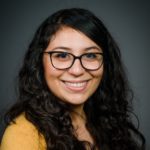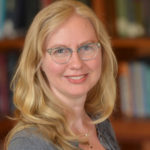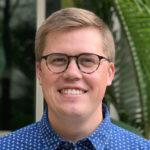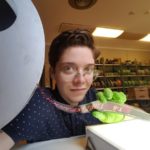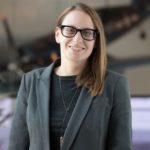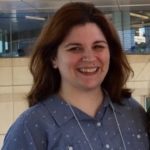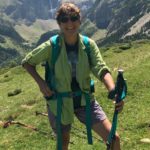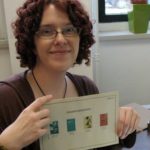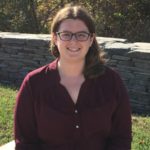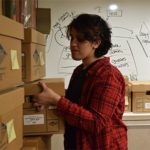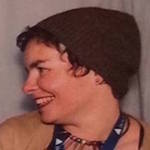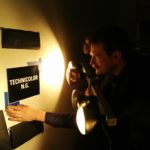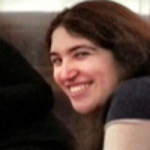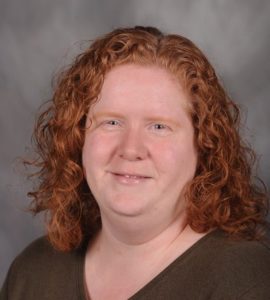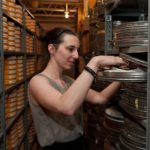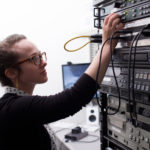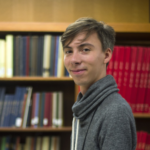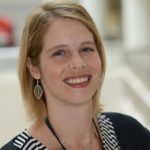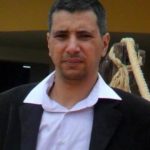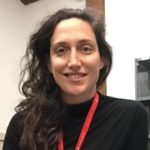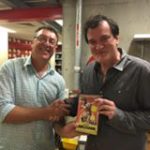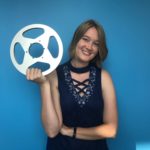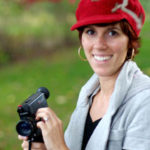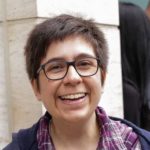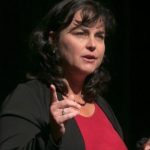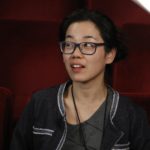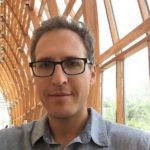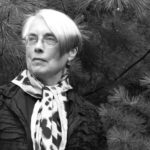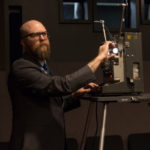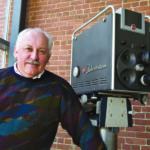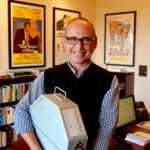2017 Speakers & Presenters
Ruta Abolins is Director of the Brown Media Archives & Peabody Awards Collection at the University of Georgia Libraries. She has over 20 years of experience in audiovisual archive preservation. Abolins received her MA in Library and Information Science from the University of Wisconsin in Madison, her MA in Popular Culture from Bowling Green State University, and her BFA in Filmmaking from the University of Wisconsin-Milwaukee. She, and her team at UGA, received a regional Emmy award for “How We Got Over” a collaborative project with Andrew Young, which focused on the preservation and access of newsfilm content from the WSB-TV Newsfilm Collection and the creation of the Civil Rights Digital Library. She works with producers on regular basis, helping them find and obtain footage, and then licensing content from across the Brown Media Archive content.
Ann Adachi-Tasch
Ann Adachi-Tasch is Executive Director of Collaborative Cataloging Japan, a not-for-profit that supports preservation and archiving of Japanese historical and experimental moving image works. Ann has worked at The Museum of Modern Art where she managed projects for the Museum’s global research initiative titled Contemporary and Modern Art Perspectives (C-MAP), and contributed to the launch of its digital platform, post (post.at.moma.org). In 2009, she organized a touring screening program and publication of Japanese experimental video and film, Vital Signals at Electronic Arts Intermix, a video art archive and distributor where she was the Distribution Coordinator. Ann has given presentations and written about the status of media archiving in Japan, at The Museum of Modern Art, Tokyo; Tate Modern (London); Keio University Art Center (Tokyo); and the Archives of American Art (Washington D.C.), among others.
Sandra Aguilar is Manager of Metadata at the USC Shoah Foundation Visual History Archive and Digital Repository. Previously she served as director of Warner Bros Archives housed at USC’s School of Cinematic Arts and Media Librarian at Industrial Light + Magic. Aguilar graduated with a BA in Film Studies from UC Santa Barbara and holds a Masters of Library and Information Science from UCLA. She is a member of Tech History Sub-committee for the Technology Council of the Academy of Motion Picture Arts and Sciences.
Selena Aleman is a candidate for a Master of Science in Information Studies with an emphasis in archives. She currently works at the Nettie Lee Benson Latin American Collection where she processes collections for the Black Diaspora Archive. Previously she has worked as a University of Texas Archives intern at the Dolph Briscoe Center for American History and digitization volunteer for the Texas Archive of the Moving Image. Selena is a former history teacher and interested in exploring ways outreach can create a more inclusive history. Outside of academics, she enjoys hiking with her dogs and visiting her local video store.
Brendan Allen currently manages the Archives for Democracy Now! in New York. He worked as a video librarian for Black Entertainment Television in 1998 and then moved to the Public Broadcasting Service in Alexandria, VA, where he worked as the library media coordinator. In 2006, Brendan earned a Master’s in Library Information Science at Pratt Institute, while working as the Senior Archivist for the United Nations Children’s Fund (UNICEF) in New York City.
Julian Antos
A projectionist, technician, filmmaker, and archivist living and working in Chicago, Julian currently serves Executive Director for the Film Society. He also works at the Music Box Theatre as Technical Director. He is a stickler for focus and his favorite movie is Meet Me in St. Louis.
Snowden Becker is the MLIS Program Manager in UCLA’s Department of Information Studies, and previously managed the interdepartmental MA degree program in Moving Image Archive Studies. She is a co-founder of the international Home Movie Day event and the nonprofit Center for Home Movies, and is currently completing her doctorate in Information Studies from the University of Texas at Austin.
Brian Belak is the Collections Manager and Client Services Director at Chicago Film Archives, where he supervises the intake of all new collections, manages their processing and storage, and works with new filmmakers and researchers to provide access to the archive’s holdings. Brian joined the staff of CFA in 2015 and holds a bachelor’s degree in Cinema and Media Studies from the University of Chicago.
Edward Benoit, III is assistant professor at the School of Library & Information Science at Louisiana State University. He is the coordinator of both the archival studies and cultural heritage resource management MLIS specializations. He received an MA in history, MLIS, and PhD in information studies from the University of Wisconsin-Milwaukee. His research focuses on participatory and community archives, nontraditional archival materials, and archival education. He is the founder and director of the Virtual Footlocker Project that examines the personal archiving habits of the 21st century soldier in an effort to develop new digital capture and preservation technologies to support their needs.
Magnus Berg is a graduate student in the Film + Photography Preservation and Collections Management Program at Ryerson University. They have worked with audiovisual collections at Visual Studies Workshop, the Canadian Lesbian and Gay Archives and Ryerson University. They have also conducted research for the Canadian Independent Filmmakers Database and the Trans and Gender Variant Filmmakers Database. Magnus has presented on moving image preservation at Archival Science and Gender Studies conferences in Canada and the United States. Their research focuses primarily on the preservation of LGBT videotape collections. In the winter they will be doing a residency at the GLBT Historical Society Archives and Museum where they will be working with their moving image holdings.
Kelly Besser
Kelly Besser works as a processing archivist and provides reference services for UCLA Library Special Collections. In addition to UCLA, Besser has processed collections for the African American Firefighter Museum, the Mayme A. Clayton Library and Museum, the Yosemite National Park Service Archives, the Los Angeles County Museum of Art, and the Tom of Finland Foundation. In 2006, she co-founded The Miracle Bookmobile, a donation-driven community-based project that redistributes free literature in Los Angeles and Oakland. Besser holds an MLIS with an Archival Studies specialization from UCLA.
Gemma R. Birnbaum, Director of the WWII Media and Education Center at The National WWII Museum, holds a Bachelor of Arts Degree in the History of Modern War and Genocide from New York University, and a Masters Degree in the History of Twentieth Century Labor & Industrialization from Tulane University. Ms. Birnbaum has been with the Museum in New Orleans since 2010. In her previous role as Assistant Director of Education for Curriculum, she oversaw the production and content curation of all digital learning projects, distance learning initiatives, curriculum materials, student programs, teacher professional development and special and traveling exhibit educational resources. Her team also launched the first in a series of produced curricula, titled “From the Collection to the Classroom: Teaching History with The National WWII Museum,” which has been distributed to more than 2,000 teachers nationwide.
Ms. Birnbaum has presented lectures on behalf of the Museum on topics that include The 1940s Black Labor Movement, The WWII Roots of the Civil Rights Movement, the Communist Underground in 1940s New York, and Jewish Armed Resistance in the Holocaust. In addition to teaching roles at the Museum of Jewish Heritage – A Living Memorial to the Holocaust in New York City and Heifer International in Arkansas, she spent several years working in customer relations, fundraising, and user interface design at internet startups in New York and at the Purdue University Research Park in West Lafayette, IN.
Leslie Bourgeois is the archivist at Louisiana Public Broadcasting (LPB) in Baton Rouge. She has held this position since 2009. As the first fully trained archivist in the history of LPB, she has been responsible for organizing, preserving and cataloging LPB’s archival collection, which dates back to the station’s debut in September 1975. She is the project manager for the Louisiana Digital Media Archive, a joint project between LPB and the Louisiana State Archives. She also manages LPB’s participation with the American Archive of Public Broadcasting, a project under the direction of the WGBH Media Library and Archives and the Library of Congress. Bourgeois has a Bachelor of Arts in history with a minor in political science and a Master of Library and Information Science with a specialization in archives management from Louisiana State University in Baton Rouge. She is also a Certified Archivist.
Itza Carbajal is the daughter of Honduran parents, a native of New Orleans, and a child of Hurricane Katrina and its aftermath. She lives in Austin, Texas currently pursuing a Master of Science in Information Studies with a focus on archival management and digital records at the University of Texas at Austin School of Information. In 2018, she will be joining the UT LLILAS Benson Latin American Studies and Collections as a Metadata Librarian as part of the “Cultivating a Latin American Post-Custodial Archival Praxis” Mellon funded project
Karen Cariani is the Senior Director of the WGBH Media Library and Archives (MLA) and Project Director for the American Archive of Public Broadcasting (AAPB), a collaboration with the Library of Congress. She has been project director for numerous projects including: WGBH’s Teachers’ Domain, now PBS Learning Media; WGBH Open Vault, the Boston Local TV News Digital Library project and for development of a digital media preservation system utilizing the Hydra technology in partnership with Indiana University. She is active in the archive community and professional organizations and passionate about the use of media archives and digital library collections for learning and education, but has a particular affinity for science and technology.
Karin Carlson is the Vault Manager at Northeast Historic Film in Bucksport, Maine. She has been at the archive for 6 years during which time she has worked on three grant funded digitization projects. She is a graduate of the L. Jeffery Selznick School of Film Preservation and holds a BA in History from the University of Wisconsin-Madison, a MFA in Digital Video Production from Governor’s State University in Illinois, and a MA in Public History from Duquesne University in Pittsburgh.
Janet Ceja is an assistant professor of Library and Information Science at Simmons College. Her research interests are in the fields of moving-image preservation and cultural archives. She teaches courses in the Archives Management concentration and Cultural Heritage concentration.
Mike Casey is the Director of Technical Operations for audio and video for Indiana University’s Media Digitization and Preservation Initiative which has digitally preserved more than 250,000 audio and video recordings as of this writing. He is the co-author of Sound Directions: Best Practices for Audio Preservation, a contributing author to the second edition of the best practices publication Guidelines on the Production and Preservation of Digital Audio Objects (known as IASA-TC 04), a contributing author to IASA-TC 05 Handling and Storage of Audio and Video Carriers, the creator of FACET: The Field Audio Collection Evaluation Tool and the co-creator of the media prioritization software applications MediaSCORE and MediaRIVERS. He also authored the Indiana University Media Preservation Survey report and is principal author for the follow-up publication Meeting the Challenge of Media Preservation: Strategies and Solutions. His article entitled Why Media Preservation Can’t Wait: The Gathering Storm that explores media degradation and obsolescence was published in the IASA Journal in January 2015. Mike is currently adjunct faculty in the Department of Library and Information Science, School of Informatics and Computing, where he teaches a class in audio preservation.
Tanya E. Clement is an Associate Professor in the School of Information at the University of Texas at Austin. Her primary area of research centers on scholarly information infrastructure as it impacts academic research, research libraries, and the creation of research tools and resources in the digital humanities. She has published widely in DH. Some of her digital projects include High Performance Sound Technologies for Access and Scholarship (HiPSTAS) through which she seeks to develop a virtual research environment in which scholars and cultural heritage professionals can better access and analyze spoken word audio collections of interest to humanists with machine learning and visualization.
Stéphanie Côté has been working at the Cinémathèque québécoise, a Canadian non-profit film archive, for nearly two decades, first as a Film Technician, then as a Film Cataloguer and Access Technician. She is now Archivist of the Cinema, Television and New Media Collections, since 2008. Film has been present in her life since early childhood. Her mother, a film editor who had her office in the family house, used to say she found her in a film bin. During her Film studies at the University of Montreal and at the Università degli Studi di Bologna in Italy, she worked on a few short films and collaborated with GRAFICS, a research group on early cinema. She attended the FIAF Summer School at the George Eastman House in 2002 and took part in many AMIA and FIAF conferences. She is also trained in film projection. She is a collaborator of the CINEMAexpo67 research group.
Dennis Cromwell
Dennis Cromwell leads the Media Digitization and Preservation Initiative (MDPI), the university-wide effort to digitize and preserve vast stores of audio, video, and film holdings. Announced by IU President Michael A. McRobbie in October 2013, MDPI is charged with preserving and providing access to these assets, many of which are in obsolete formats and actively degrading. Working closely with the IU Library, Cromwell is also active in promoting the preservation effort across higher education, including participation in the Digital Preservation Network.
Cromwell previously served IU as associate vice president for several UITS divisions, including client services and support, enterprise infrastructure, and university information systems. In those roles, he worked extensively with faculty, students, and administration to deliver and support mission-critical technologies, including enterprise-wide software, data centers, servers and storage, campus networks, and identity management. Cromwell has a BS in mathematics and master of public affairs from Indiana University.
Rachel Curtis is a digital project specialist at the Library of Congress and serves as the Project Coordinator for the American Archive of Public Broadcasting. In this capacity, she manages the ingestion of preservation files and associated metadata into the Library’s archive, works with WGBH on policy and strategy, and coordinates Library staff on AAPB activities. Previously, she worked at the Harley-Davidson Corporate Archives, managing digitization projects for their audiovisual material. She holds a Master’s degree in Library and Information Science from the University of Wisconsin-Milwaukee.
Pooja Desai is the current assistant archivist at Asian/Pacific/American Institute, where she has worked to catalog and digitize the video portion of the Jack G. Shaheen Collection. She holds an M.A. in Archives and Public History from New York University, with a concentration in Public History.
Yasmin Dessem
Yasmin Dessem is the Head of the Audiovisual Preservation Studio at UCLA Library where she serves as the technical lead as the library continues to develop its program of preservation, digitization and access of its moving image and sound holdings. Previously she managed archive deliverables for new feature releases at Paramount Pictures. Since 2015, as part of UCLA Library’s International Digital Ephemera project, she has partnered with heritage institutions in Cuba and South Africa to provide digitization and preservation training.
Melissa Dollman earned her M.A. from the University of California, Los Angeles in Moving Image Archives Studies, and is currently pursuing her Ph.D. at the University of North Carolina at Chapel Hill. She has been a librarian, a/v archivist, consultant, intern, fellow, volunteer, instructor, exhibit developer, and researcher. She is currently on the AMIA board of directors.
Blaine Dunlap is an independent moving image conservator and curator. He is currently collaborating with Ruta Abolins, Brown Media Archive, University of Georgia Special Libraries, to develop an interactive finding aid relationship between edited documentaries and their outtakes. Earlier this year, under the guidance of Liz Coffey, Harvard Film Archive, and with significant assistance from Skip Elsheimer and Tommy Aschenbach, Dunlap completed restoration of James E. Hinton’s 1977 documentary, “New Orleans Concerto,” a portrait of composer Roger Dickerson. This film becomes the most recent addition to a metacollection of about 90 non-fiction objects created in NOLA from 1959-2007, “The Televised History of New Orleans,” for NOLA educators. Key to project’s design is demonstrable provenance of objects, as well as no-fee licenses from owners. Dunlap studied documentary film editing with Stephen Schmidt at the Meadows School of the Arts, SMU. His work has been supported by the National Endowment for the Arts, the Ford Foundation, the Corporation for Public Broadcasting, and the Ruth U. Fertel Foundation. His work with Sol Korine is held by the Brown Media Archive, and can be seen on Folkstreams.net. Blaine Dunlap is a Guggenheim Fellow and lives in Denton County, TX.
Jon W. Dunn is Assistant Dean for Library Technologies in the Indiana University Bloomington Libraries, where he oversees IT development and operations, including technical support, systems administration, software development, digital preservation, and digital collections services. He has been involved in the development of digital library systems for audio and video for over twenty years and currently serves as co-project director for the Avalon Media System, an open source digital repository software system for audio and video access supported in part by the Andrew W. Mellon Foundation and Institute of Museum and Library Services. He serves on the leadership team for Indiana University’s Media Digitization and Preservation Initiative and on the steering group for the Samvera (formerly Hydra) open source digital repository community. He also co-chairs the International Image Interoperability Framework (IIIF) Consortium’s Audio/Video Technical Specification Group.
Dino Everett is the archivist and curator of the Hugh M. Hefner Moving Image Archive at USC. His career began in the 1970’s as a teenager running 35mm carbon arc projectors at a Florida Drive In… He has published and presented articles both on the history and technology of the moving image field and supports the safe use of original archival material and technology. He is currently working on a feature length documentary about Los Angeles punk rock in the 1970’s and has been dubbed the punk rock archivist.
Jay Fialkov is Deputy General Counsel at WGBH, Boston’s public broadcaster, a leading producer of public media content for television, radio, the internet, and new media. WGBH’s non-broadcast services include its current collaboration with the Library of Congress to preserve and make available to the public the American Archive of Public Broadcasting, a historic collection of American public television and radio content. Mr. Fialkov is also a Professor at Berklee College of Music, where he teaches courses on legal aspects of the music business and was honored with Berklee’s 2014 Distinguished Faculty Award. Before joining WGBH in 1995, Mr. Fialkov was a Boston-based entertainment lawyer whose clients included the music group Phish, Maurice Starr (manager and producer of New Kids on the Block), Mark Wahlberg, George Thorogood, Rounder Records and Rykodisc. Mr. Fialkov was a founder and owner of the Giant/Rockville record labels that released albums by the critically acclaimed rock group Uncle Tupelo, whose offshoots include Wilco and Son Volt. Mr. Fialkov received his B.A. degree, cum laude, from Clark University in 1977. He is a 1981 graduate of Boston University School of Law, where he was an Editor of the Law Review.
Allyson Nadia Field is Associate Professor of Cinema and Media Studies at The University of Chicago. A scholar of African American cinema from the silent era to the contemporary, her work combines archival research with concerns of film form, media theory, and broader cultural questions of representation. She is the author of Uplift Cinema: The Emergence of African American Film & the Possibility of Black Modernity (Duke University Press, 2015) and co-editor with Jan-Christopher Horak and Jacqueline Stewart of L.A. Rebellion: Creating a New Black Cinema (University of California Press, 2015). She also served as a co-curator of the L.A. Rebellion Preservation Project of the UCLA Film & Television Archive. With Marsha Gordon, she is co-editing Screening Race in American Nontheatrical Film (Duke University Press, Forthcoming 2018). Her current book project is on African American film historiography, the challenge of evidence, and the “speculative archive.”
Walter Forsberg works in film culture and is Media Archivist at the Smithsonian’s National Museum of African American History and Culture. Alumnus of New York University’s Moving Image Archiving and Preservation graduate program, Walter was the technical architect of the New Museum of Contemporary Art’s XFR STN exhibition, winner of the 2014 Innovation Award for digital stewardship from the Library of Congress. His recent writing on film appears in BlackFlash magazine, the Strange Currencies: Art & Action in Mexico City, 1990-2000 exhibition catalog, and in the INCITE Journal of Experimental Media, where he is a contributing editor.
Rebecca Fraimow – Project Manager (WGBH)
After first coming to the WGBH Media Library and Archives as a National Digital Stewardship (NDSR) Resident in 2014, Rebecca joined the staff of WGBH in 2015, where she currently focuses on the Public Broadcasting Preservation Fellowship, the development of the PBCore metadata standard, and the ongoing migration of digital assets. Prior to moving up north, Rebecca served as the Audiovisual Projects Manager for the Dance Heritage Coalition, managing a large-scale endeavor to digitize and make accessible dance-related media. She also worked on the XFR STN exhibit at the New Museum, which opened up video preservation to the public, and subsequently co-founded XFR Collective, a New York-based nonprofit organization focused on the preservation of at-risk and obsolete community media. Rebecca holds an MA in Moving Image Archiving and Preservation from NYU.
Clara Sánchez-Dehesa Galán studied Film Preservation in the L. Jeffrey Selznick School, where she received the Haguefilm Scholarship 2011. Later she completed her studies in audio-visual heritage through a Master’s degree from the Complutense University in Madrid. She has carried out her work as a conservator in various projects in USA, Spain, Bolivia and Mexico. Right now she is the President and one of the founders of the Home Movie Network in Spain. She combines her freelance work, focuses on recovery and dissemination of Alava’s hidden film heritage, with the coordination of the Film Preservation Studies Department of the Elías Querejeta Zine Eskola.
Sarah Gardner grew up in southern Mississippi and studied both English and Fine Art at the University of Mississippi. She is now working to obtain a Master’s degree in Information Studies from the University of Texas at Austin (UT). She has worked full time as a library assistant in both public and university libraries for the last six years and currently works as a Circulation Supervisor at the Tarlton Law Library at UT. She is looking forward to continuing this important work in a professional capacity when she graduates in 2019.
Marsha Gordon is Professor of Film Studies at North Carolina State University. She is the author of Film is Like a Battleground: Sam Fuller’s War Movies (Oxford University Press, 2017) and Hollywood Ambitions: Celebrity in the Movie Age (Wesleyan University Press, 2008), and co-editor of Learning With the Lights Off: Educational Film in the United States (Oxford University Press, 2012). She is the former co-editor of The Moving Image (University of Minnesota Press), the journal of the Association of Moving Image Archivists, and is currently completing a book on Race and Nontheatrical Film for Duke University Press, co-edited with Dr. Allyson Nadia Field.
Karen F. Gracy is Associate Professor in the School of Library and Information Science at Kent State University. She is author of Film Preservation: Competing Definitions of Value, Use, and Practice and editor of Emerging Trends in Archival Science, to be published in 2017 by Rowman and Littlefield. Other recent publications include research on the connection between Hollywood and the Cleveland Public Library in the 1920s and 30s for Library and Information Science History, the evolution of moving image preservation in cultural institutions for Information & Culture: A Journal of History, and professional attitudes toward digital distribution of archival moving images for The American Archivist. She also is deeply interested in developing pedagogical frameworks and competencies for moving image archiving education.
Siobhan Hagan is the President & CEO of MARMIA (the Mid-Atlantic Regional Moving Image Archive) and holds her M.A. in Moving Image Archiving and Preservation (MIAP) from NYU’s Tisch School of the Arts. She has worked in a variety of collecting organizations throughout her career, including the UCLA Library, the National Aquarium, and the Old Greenbelt Theatre. She is currently consulting as a Motion Picture Film Preservation Specialist at the Smithsonian’s Archives of American Art. She is also active in the Association of Moving Image Archivists (AMIA): she has served as co-chair of the Regional Audio-Visual Archives Committee since 2013, as a member of the AMIA Board of Directors since the fall of 2015, and as a co-chair of the Local TV Task Force since February of 2017.
Dinah Handel
Dinah currently works in the New York Public Library’s Digital department as the Mass Digitization Coordinator. Prior to this, she was a National Digital Stewardship Resident at CUNY Television. She holds an MLIS from Pratt Institute and a BA from Hampshire College. She has been a full-time member of the XFR Collective since June 2016.
Genevieve Havemeyer-King
Genevieve is currently Media Preservation Assistant for the New York Public Library’s Special Collections and Preservation Services department. She is also a former National Digital Stewardship Resident, part-time projectionist at Anthology Film Archives, and was recently elected Co-chair of the AMIA Projection & Technical Presentation Committee.
Heather Heckman is Director of Moving Image Research Collections at the University of South Carolina. She holds a PhD in Communication Arts (Film Studies) from the University of Wisconsin-Madision. She also earned MAs in Library and Information Studies and Communication Arts from the same institution. Her publications include “Burn After Viewing, or, Fire in the Vaults: Nitrate Decomposition and Combustibility” (The American Archivist, Winter 2010) and “We’ve Got Bigger Problems: Preservations during Eastman Color’s Innovation and Diffusion” (The Moving Image, Spring 2015).
Donna Hensler is a film producer and lecturer of producing at The University of Melbourne, Victorian College of Arts School of Film and Television. She is currently undertaking a PhD research project – a case study in the digitisation, preservation and dissemination of Australia’s oldest film school audio-visual collection. In between all this, Donna is still making films, recently having produced two short films, The End of the Earth and The Fox, both of which had excellent success on the international and national film festival circuit. She is also just about to produce a micro budget social impact feature film, titled Disclosure to be released in late 2018.
Libby Savage Hopfauf is the Program Manager/Lead Audiovisual Archivist at Moving Image Preservation of Puget Sound (MIPoPS) and Project Audiovisual Archivist at Seattle Municipal Archives (SMA) in Seattle, Washington. She received a Masters in Library and Information Science from the University of Washington and a Bachelor of the Arts in Creative Writing with a minor in Sociology from Western Washington University. She is passionate about creating resources that provide intuitive use of open-source tools, making the digitizing process accessible to archivists (with a wide variety of skill-levels) to ensure the sustainability of institutions to preserve their videotape and conquer the magnetic media crisis.
Charles Hosale is Special Projects Assistant at the American Archive of Public Broadcasting and WGBH Media Library and Archives. There his responsibilities include coordinating digitization projects, ingesting media and metadata into the AAPB, and facilitating quality control and digital preservation of archival records. Previously, he was the AV Project Archivist at the University of Wisconsin-Milwaukee, and an Archivist at both MillerCoors and Robert W. Baird and Company. He holds a Master’s degree in Library and Information Science with an Archives concentration from the University of Wisconsin-Milwaukee.
Martin Johnson is an assistant professor of media and communication studies at The Catholic University of America. He has published articles in Early Popular Visual Culture, the Historical Journal of Film, Radio, and Television, and The Moving Image. His first book, Main Street Movies: The History of Local Film In The United States, will be published by Indiana University Press in 2018. He is currently at work on a book on the history of the advertising film in the United States, 1896-1941.
Blanche Joslin is pursuing her MA in the Film + Photography Preservation and Collections Management program at Ryerson University in Toronto. She previously worked on Royal Caribbean Cruise Lines as a Head Broadcast Technician and as a Digital Content Producer with a photography company in Florida. This previous experience has guided her research into born digital archival systems.
Casey Davis Kaufman is Associate Director of the WGBH Media Library and Archives and Project Manager for the American Archive of Public Broadcasting. In her role, Casey supervises all matters and projects related to access, outreach, websites, metadata systems, digitization, and crowdsourcing. She also assists with fundraising and sustainability efforts. Prior to joining the WGBH MLA, Casey worked on digital projects for PBS’ flagship history documentary series, American Experience. Casey currently serves as the AMIA Copyright Committee Chair and looks forward to joining the AMIA board at the 2017 AMIA conference.
Mary Kidd
Mary currently works at New York Public Library’s Special Collections Division as their Systems and Operations Coordinator. Prior to this, she was a National Digital Stewardship Resident at New York Public Radio. She has been a full-time member of the XFR Collective since 2016.
Julia Kim
Julia Kim is the Digital Assets Specialist at the American Folklife Center at the Library of Congress. She creates born-digital and digitized workflows on major collections such as StoryCorps, the Alan Lomax Archive, and Indigenous American Cylinder Recordings. She holds a master’s degree from the New York University Moving Image Archiving and Preservation Program, is an alumna of the New York National Digital Stewardship Residency Program, and a co-founder of XFR Collective, an audio-visual non-profit. She has a background in time-based media, digital forensics, and complex media.
Criss Kovac is the supervisor of the Motion Picture Preservation Lab at the National Archives and Records Administration. Over the course of the last decade she has overseen preservation and digital restoration projects including Nine From Little Rock, A Year Toward Tomorrow, With the Marines at Tarawa, The Negro Soldier, Let There Be Light, and The March. She recently completed digital preservation of William Wyler’s outtakes from The Memphis Belle: Story of a Flying Fortress. She is an active participant in multiple moving image professional organizations and in creating technical guidelines for archives, libraries, and museums. She holds degrees from Oberlin College, The Nottingham Trent University, and The L. Jeffrey Selznick School of Film Preservation.
Chris Lacinak is the President of AVPreserve, a consulting and software development firm with a focus on empowering organizations to maximize the usability of their data. Recent clients include Indiana University and the Library of Congress. Chris served for 6 years as an Adjunct Professor at NYU’s MIAP program and sits on the AMIA board.
Marie Lascu
Marie Lascu is a graduate of NYU’s Moving Image Archiving and Preservation (MIAP) M.A. program. She is the audiovisual archivist for Crowing Rooster Arts, a non-profit that has spent over 20 years documenting the arts and political struggles of Haiti. She is a member of the Community Archiving Workshop (CAW) committee, participating in multiple workshops organized during annual AMIA conferences. Since 2015, she has been an active member of the XFR Collective, a non-profit organization that partners with artists, activists, individuals, and groups to lower the barriers to preserving at-risk audiovisual media.
Dimitrios Latsis is Assistant Professor of Film Studies at the School of Image Arts of Ryerson University in Toronto where he teaches in the Film Studies and Film and Photography Preservation and Collection Management programs. He received his PhD in Film Studies from the University of Iowa and completed a postdoctoral fellowship in Visual Data Curation at the Internet Archive where he served as film archivist. His work on American visual culture, early cinema and the Digital Humanities has been supported by the Smithsonian Institution, Domitor and the Mellon and Knight Foundations among others. He has published widely in the fields of American Visual Culture, historiography and theory and cinema and archival studies. He is currently co-editing an anthology on documentaries about the visual arts in the 1950s and 60s, and writing a monograph on the historiography of American cinema during the early and silent years.
Jim Lindner is an internationally respected authority on the preservation and migration of electronic media. Jim pioneered many of the techniques now commonly used for videotape preservation, restoration and migration to file workflows. He has lectured widely on and written about media preservation for the past twenty-five years and has served on a variety of international media-associated boards and organizations for many years. While Jim’s first awards were as a film maker, he went on to receive many awards, first for his pioneering work in computer animation and later for his work in media preservation.
Jim received a patent for his invention called SAMMA which is used around the world to preserve video recordings, and has become a Technical Emmy Award winner for the same invention. He was the recipient of SMPTE Archival Technology Medal Award in 2015. Jim was honored to be recognized as a SEAPAVAA fellow. Jim has published many articles and documents in the field, most recently he co-authored with Mick Newnham “Case Studies for AV Preservation” published by the Prestocentre Foundation. He is honored by the establishment of The James A. Lindner Digital Archive Fellowship by The HistoryMakers in Chicago.
Most recently Jim has been researching alternative approaches to Digital Film Preservation in the FILMIC project.
Sheena Manabat is a master’s student at the University of Calgary in Communications, Media and Film with a background in Film Studies and English Literature. Her academic interests include cultural identity, new media and amateur cinema. Sheena is a research assistant on the “Amateur Movie Database” project, now in it’s third year. Currently, her thesis research focuses on film history and culture in a local context, by examining home movies of East Asian immigrants in Calgary.
Amita Manghnani is the Director of Public Programs & Communications at the Asian/Pacific/American Institute at NYU. As a graduate student, she curated A is for Arab, a traveling exhibition featuring images from the Jack G. Shaheen Collection on Arabs in U.S. Film and Television, and edited an accompanying publication. She holds degrees from Brown University and New York University.
Ana Marie
Originally from the Austin area, Ana Marie attended The University of Texas and received a BA in Art History and an MSIS in Information Studies. She was also a DJ for KVRX Student Radio, spinning “none of the hits all of the time.” After graduation in 2012, Ana crisscrossed the country, first working with art collection records at the Perlman Teaching Museum at Carleton College in Minnesota and in digital asset management at Phoenix Art Museum in Arizona. Ana moved to New York in 2015 to work on a two year NEH Grant to transfer historic WNYC radio broadcasts at New York Public Radio. In addition to being a member of XFR Collective, she is currently an Archivist at The Museum of Modern Art.
Brian Meacham received his Masters of Library and Information Science with a concentration in Archives Management from Simmons College and began work as the Archive Coordinator at the Harvard Film Archive in 2002. He received a Certificate in Film Preservation from the L. Jeffery Selznick School at George Eastman House in Rochester, New York in 2006.
As the Public Access Coordinator at the Academy Film Archive from 2006 to 2008, he oversaw public, scholarly, and commercial access to the holdings of the Academy Film Archive. As Short Film Preservationist from 2008 to 2013, he curated and preserved a collection of hundreds of live-action and animated short films, and also helped spearhead a collaborative effort to repatriate and preserve American silent films found in the New Zealand Film Archive.
Since 2013, Brian has been Archive and Special Collections Manager at the Yale Film Study Center, where he oversees acquisition, inspection, cataloging, and preservation of the FSC’s growing film collection, which includes print and pre-print elements acquired by the university over the last 50 years. He also programs and presents films from the collection in the “Treasures from the Yale Film Archive” public screening series, and teaches in the university’s Film & Media Studies graduate program.
I am an archivist at Elgzala Techno Park. I have worked with national institutions to preserve national heritage audio-visual archives and sound for three years. I am addicted to cinema, music, audio- visual. It is my passion. It is also my most essential goal to preserve our heritage. Following the development of new technologies, which makes the task easier, to restore than analog. Finally, we have a great heritage to preserve. My presence at the AMIA conference is a great opportunity for me, as a new professional, to discover new methodologies of conservation of audio-visual archives with colleagues because our common goal is preservation of the memory of the world.
Shani Miller
Shani Miller is an assistant audiovisual preservationist working at the UCLA Library. Shani has been coordinating the Haynes Foundation funded Golden State Mutual Audiovisual preservation project where her responsibilities range from curation to digitization and metadata creation. She first interacted with the Golden State Mutual records conducting research as a graduate student. She holds a Master’s degree in Moving Image Archive Studies from UCLA.
Steve Moore is a senior archivist working with the audiovisual collection at Library and Archives Canada where he acquires film, video, sound recordings and born digital AV, other media and textual records, pertaining to filmmakers and broadcasters. He has specialized knowledge of the Canadian feature film and broadcasting collection. Steve’s current work includes the Canada on Screen initiative, a project of Canada 150, a year-long celebration of the 150th anniversary of Confederation, a partnership with the Toronto International Film Festival, la Cinémathèque Québécoise and the Cinematheque in Vancouver.
Steve emigrated to Canada in 1967, Canada’s centennial year. He arrived, by ocean liner, in Montreal during Expo 67. The first building in Canada he can remember seeing from the ship was the U. S. Pavilion.
Bill Morrison is a director and editor, known for Decasia (2002), Dawson City: Frozen Time (2016) and The Film of Her (1997).
Hope O’Keeffe has been Senior Associate General Counsel of the Library of Congress since November 2006, supervising all collections matters including acquisitions, copyright and permissions, social media, web archiving, and increasing digital access to Library collections. Prior to joining the Library she worked at the National Endowment for the Arts in the Office of General Counsel and in the Office of National Initiatives. Before NEA she worked as a litigator at Arnold & Porter and a union lawyer at Bredhoff & Kaiser, and clerked for the DC Circuit. She attended Amherst College and the George Washington University Law School.
Andrew Oran
Andrew Oran is VP of Large Format and Restoration Services at Fotokem.
Devin Orgeron is the author of Road Movies: From Muybridge and Melies to Lynch and Kiarostami (Palgrave, 2008). His articles have appeared in Cinema Journal, The Velvet Light Trap, The Moving Image, The Journal of Film and Video, CineAction, College Literature, Post Script, and Film Quarterly. He is the co-editor of Learning With the Lights Off: Educational Film in the United States, (Oxford University Press, 2012). Dr. Orgeron is the former editor of The Moving Image (University of Minnesota Press), and he currently co-chairs that organization’s Publications Committee. Since joining the Film Program at NCSU, Professor Orgeron has taught a wide range of courses focused on nonfiction and nontheatrical film and has worked closely with budding documentary filmmakers who have trained their cameras on a variety of subjects.
I am presently in my final year pursuing a MLIS degree from UCLA with an emphasis on media archiving. Originally from San Diego, I received my undergraduate degree in English from USC followed by my MFA in Film/Video from CalArts. After working in academics building and managing production spaces I moved into special effects post-production editorial work before recognizing an interest in film preservation. I was hired by the CalArts Library to migrate their teaching image collection into a digital repository. This lead to digitization projects for the Library’s varied collections including the film and video collection which source of my work since 2014. I most recently completed a summer professional internship at the Walt Disney Studios working on digital asset management and am currently interning in the archives at Twentieth Century Fox.
Hannah Palin has been working on grant-funded moving image projects at the University of Washington Libraries, Special Collections for over fifteen years. In her work as the Moving Image Curator, she managed the Washington Film Preservation Project, co-authored the Washington State Film Preservation Manual, Low-Cost and No-Cost Suggestions to Care for Your Film with Nicolette Bromberg and is a co-founder of Moving Image Preservation of Puget Sound. Ms. Palin worked in both film and radio production and, before coming to Special Collections, spent forty hours a week, sitting in the dark, watching home movies at a local film transfer lab.
Nazareth “Naz” Pantaloni is Head, Copyright Program, at Indiana University Libraries. He was previously the Assistant Director for Copyright and Administration at the Jacobs School of Music’s William and Gayle Cook Music Library.
He is an affiliated faculty member with Indiana University Maurer School of Law’s Center for Intellectual Property Research. In addition, he teaches courses on copyright law, music copyright and licensing, and legal issues in arts administration in the IU Jacobs School of Music, the IU Department of Information and Library Science, and the IU School of Public and Environmental Affairs Graduate Program in Arts Administration.
John Passmore is an archivist and media conservator from New York City. He is currently the Archives Manager at New York Public Radio where he manages the preservation and restoration of historic audio recordings. Prior to NYPR, John worked with a number of major museums and galleries on the restoration, exhibition, and acquisition of archival audiovisual artwork. John has also worked at Smithsonian Folkways Recordings, has been a studio and touring musician, and regularly serves as a video inspector and film repair specialist at international film festivals. Lately, his work is increasingly focused on optical media preservation and to the potential of 3D printing to rescue archives from hardware obsolesce.
Cate Peebles is the National Digital Stewardship Resident for Art Information at the Yale Center for British Art. Her current project focuses on the digital preservation of born-digital museum records and permanent collection documentation. Previously, she has worked as a Project Archivist at the Senator John Heinz History Center, and as a Processing Archivist for the University of Pittsburgh’s Special Collections and the Carnegie Museum of Art. She received her MLIS, with a concentration in Archival Studies, from the University of Pittsburgh in 2016.
Nick is currently the Collections and Access Manager at ACMI but has worked in film archives for over 25 years.
Having developed an interest in moving image new media technologies at school he was fortunate to work in the Film Archives of the Australian Institute of Aboriginal and Torres Strait Islander Studies (AIATSIS) in Canberra. While there he undertook preservation and cataloguing work producing the Filmography of Indigenous Australia, listing over 30,000 moving image items.
He has worked as an Image Technology Producer on “Lord of the Rings”, operated a private research company and has extensive experience as a project manager.
At ACMI Nick manages a moving image collection comprising 160,000 individual items ranging from 16mm film prints dating back to the early 1900s to the latest in digital and virtual reality art pieces. The Collections focus is on public access which necessitates all aspects of preservation, conservation, transformation and cataloguing. Leading a small team the current focus is on digitisation of rare and fragile film and magnetic media. Recently completing a preservation project on videogames of the 1980s, this ground breaking work has been the subject of recent international conference presentations.
Mackenzie Roberts is currently finishing her MLIS degree at Louisiana State University, where her focus is on archival practice. She is also currently interning with the Research, Archive, and Data Strategy team at NPR in Washington, D.C. Mackenzie received her BFA in Film/Television from the Savannah College of Art and Design and got her first MA in Film Studies from Columbia University, where she produced a thesis on segregated movie theaters in the American South during the first half of the twentieth century. She has previously interned at the Library of Congress Packard Campus, and the Ralph Rinzler Archives at the Smithsonian Center for Folklife and Cultural Heritage. She has also worked as a library page in the Billy Rose Theatre Division of the New York Public Library and as a museum educator for the Museum of the Moving Image. After graduation, she hopes to continue her career in audio-visual preservation and digitization.
Sara Rogers is a graduate student at the University of Texas at Austin School of Information where she is pursuing a Master of Science in Information Studies. While her studies have focused on digital archives and records management, she finds herself increasingly interested in the preservation of audiovisual materials in cultural heritage institutions. Currently, she works as a Graduate Research Assistant at the Alexander Architectural Archives at the University of Texas Libraries.
Sadie Roosa is a Project Manager/Metadata Specialist for WGBH and the American Archive of Public Broadcasting where she oversees cataloging projects and website development. She is also the Vice-President of Digital Commonwealth. Her interests include access strategies to make moving image and sound collections more available online in terms of rights, discoverability, and technology.
Elena Ross-Snook currently serves as Collection Manager for the Reserve Film and Video Collection (the circulating 16mm collection of The New York Public Library). She is also an Assistant Professor at Pratt Art Institute and Chair of the AMIA Film Advocacy Task Force.
Angela Saward has been at Wellcome for 12 years; working with archive film and video for 25 years. She currently works within Wellcome Collection’s Research Development team on identifying, developing and engaging audiences with our unique collections with a particular focus on the broadcast, media and film sectors. She aims to work towards building a better understanding and receptiveness to our material as well as build relationships with all kinds of stakeholders either internally or externally. More recently she has been looking at animation and has been impressed by its educational and entertainment capital.
Greta Scharnweber is the Associate Director of the Hagop Kevorkian Center, where she curates a robust, interdiciplinary program of public events pertaining to the field of Middle East Studies, and manages Center staff, grants, and operations. She has been an advocate for the Jack G. Shaheen archive since its earliest days at NYU. She holds an MA in Arab Studies from Georgetown University, an MA in Religious Studies from University of Colorado, and a BA in Religion from Kenyon College.
Brett Scheuermann is the Film Subject Matter Expert at Memnon Archival Services. He manages the operations of the film digitization studio and oversees all aspects of the digitization process from cleaning to repair to scanning to quality control. His role in MDPI is to facilitate the success of the program at the digitization level by assuring that the lab is producing high-quality scans and ironing out snags in the workflow. His responsibility to the client requires the he be in constant communication with the IU staff so that all parties are kept up to speed and issues are solved in a timely manner. Brett graduated from the L. Jeffrey Selznick School of Film Preservation in 2015 and is, above all, intent on performing the most ethical and theoretically sound preservation work.
Adam Schutzman has been working with audio-visual collections and archives for over 6 years, including positions at the Harvard University Archives, the Schlesinger Library and Bread and Puppet Theater. He currently works as a Research Assistant to Dr. Janet Ceja while completing a master’s degree in the Archives Management track of the Library and Information Science program at Simmons College. He also serves as President of the AMIA Student Chapter at Simmons and is on the Steering Committee for the Moving Image and Recorded Sound Roundtable within New England Archivists. He is passionate about audio-visual preservation, community archives, oral history and outreach. Before getting into the archives field, he worked as a teacher for over a decade and is excited about helping to advocate for and educate about the unique needs of audio-visual collections to current and future generations of archivists.
Winnie Schwaid-Lindner
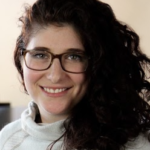 Winnie is an MA candidate in the NYU Moving Image Archiving and Preservation (MIAP) program. So far, she has loved working with The Jewish Museum, the New York Public Library, and the Library of Congress NAVCC in Culpeper, VA, where she continues work on her thesis. Winnie is passionate about all content and carriers, but is particularly fond of digital preservation and born-digital materials.
Winnie is an MA candidate in the NYU Moving Image Archiving and Preservation (MIAP) program. So far, she has loved working with The Jewish Museum, the New York Public Library, and the Library of Congress NAVCC in Culpeper, VA, where she continues work on her thesis. Winnie is passionate about all content and carriers, but is particularly fond of digital preservation and born-digital materials.
In her mostly-imagined spare time, she enjoys taking her dog for long walks and subscribing to far too many podcasts.
Tali Singer is a computational linguist and software engineer at Pop Up Archive, where she focuses on research and development related to speech recognition and natural language processing. She holds a bachelor’s degree in linguistics and a master’s in computational linguistics from Brandeis University. A public-radio-producer-turned-computer-scientist, Tali has worked as an associate producer of Interfaith Voices. Not surprisingly, when she’s not at work, you can find Tali listening to podcasts of all sorts.
Amy Sloper is the Head Film Archivist at the Wisconsin Center for Film and Theater Research in Madison, Wisconsin and a lecturer and advisor in UW-Madison School of Information. Before returning to her home state of Wisconsin, she held positions at the Harvard Film Archive, the Getty Research Institute, and the Director’s Guild of America. She serves on the Board of Directors at the Center for Home Movies and has been organizing Home Movie Day and community archiving events since 2007 in storefronts, cinemas, community centers, classrooms, libraries, and public access television stations from Boston, MA to Bayfield, WI.
Molly Rose Steed is Assistant Head, Moving Image and Sound Archivist at the University of Utah’s J. Willard Marriott Library. She oversees the Audio-Visual Archive within the Library’s Special Collections Division, which specializes in materials representing the history and culture of Utah and the American Intermountain West. While pursuing a master’s degree in Film Studies with concentration in Film Archiving at the University of East Anglia and volunteering at both the Yorkshire Film Archive and the East Anglian Film Archive, Molly developed a love of regional film. When she completed her degree she returned home to Salt Lake City where she has been an archivist at the University of Utah since 2008.
Rachael Stoeltje is the founding Director of the Indiana University Libraries Moving Image Archive (IULMIA). For two decades, she has worked on preserving, archiving and providing access to vast and varied film, photography, media and individual personal collections. In 2010, she formally established the IU Libraries’ moving archive collections into the IULMIA archive. In addition to managing the moving image archive, her other work includes research on many topics; teaching and educational outreach programs and the planning and development for film and video digitization and access for the IU campus project. She also serves as an Executive Committee member of the International Federation of Film Archives (FIAF) and as the FIAF representative for CCAAA (Co-ordinating Council of Audiovisual Archives Associations) and on a handful of other archival, film and media related boards.
Nobukazu Suzuki
Nobukazu Suzuki is an audiovisual archivist who has worked in film preservation and digitization for 13 years. Nobukazu learned the foundations of film archiving when he worked as an assistant film curator, from 2005 to 2007, at the National Film Center, The National Museum of Modern Art, Tokyo.
As a film technician at Tokyo Ko-on, Inc., since 2007, he has repaired and digitized several thousand films from the 1910s to the present. H has conducted the film salvation project for the great East Japan Earthquake since 2011 and devised salvaging methods for water damaged films and videotapes.
From 2014 to 2015, he worked as an AV archivist at the Bophana Audiovisual Resource Center in Cambodia supported by Overseas Study Program for Emerging Artists program by the Agency for Cultural Affairs, Japan. He inspected the film collection of the Cambodian government and carries on researching Cambodian film history. Since 2016, he worked as a film preservation consultant for the film preservation project in Malawi, Africa, organized by National Archives of Malawi, Rei foundation Ltd., and Tokyo Ko-on, Inc.
He is a member of Film Preservation Society, Tokyo and an individual member of SEAPAVAA.
Jade Takahashi is the Archivist of the Oral History Projects Department at the Academy of Motion Picture Arts and Sciences. She received her MA in Moving Image Archive Studies at UCLA, and BA in English Literature at UCLA. She has experience processing film, paper, photo and digital materials, working and volunteering in film archives, museums, university libraries, and post production houses. In her current position, she oversees the oral and visual history collections, handling acquisitions, collection management and processing, outreach, and assists with the department’s productions.
Charles Tepperman is Associate Professor and Graduate Program Director in the Department of Communication, Media and Film at the University of Calgary. He previously worked in the film preservation lab at Library and Archives Canada and on amateur film collections at Chicago Film Archives. Tepperman has published articles on Canadian film policy, non-theatrical film culture, film technology, and early cinema in Canada. He is the author of Amateur Cinema: The Rise of North American Moviemaking, 1923-1960 (University of California Press, 2015) and Director of the Amateur Movie Database Project (amateurcinema.org).
Sharon Thompson is Executive Director of the Lesbian Home Movie Project (LHMP). She was co-editor of Powers of Desire: The Politics of Sexuality and she’s the author of Going All the Way: Teenage Girls’ Tales of Sex, Romance & Pregnancy. Her stories and articles have appeared in a wide range of anthologies and periodicals.
Lauren Tilton
Lauren Tilton is Assistant Professor of Digital Humanities in the Department of Rhetoric & Communication Studies and affiliated with the American Studies Program at the University of Richmond (Virginia, USA). Her work focuses on the politics of representation in the United States, using approaches from the digital, public humanities. She directs Photogrammar (photogrammar.yale.edu), an interactive web-based platform for New Deal and World War II photography. Her current multimodal projects are Participatory Media, which traces the history of collaborative and community-based media making in the 1960s, and DistantTV (distantv.org), which applies computational methods to the analysis of Network Era television. She is the co-author of Humanities Data in R (Springer, 2015) and co-editor of the American Quarterly Special Issue on Digital Humanities (2018). She received her PhD in American Studies from Yale University and is the Chair of the American Studies Association’s Digital Humanities Caucus.
Erica Titkemeyer – Project Director / AV Conservator (University of North Carolina at Chapel Hill)
Erica coordinates the preservation and access of audiovisual materials for Wilson Library Special Collections at UNC. Aside from overseeing the preservation of analog AV, she is charged with managing born-digital acquisitions for the Southern Folklife Collection, which consist primarily of audio and video recordings. Alongside IT staff and the University Archivist for Electronic Records, she has been working to develop workflows, standards, and staff roles and responsibilities as they relate to born digital documentation, ingest and long-term preservation and access to the content. Prior to this position, Erica was a National Digital Stewardship Resident at the Smithsonian Institution Archives, working to produce best practices and recommendations for museums collection digital media artworks.
Katie Trainor
Katie Trainor is currently Film Collections Manager at the The Museum of Modern Art in New York City.
Laura Treat
Laura Treat received her MSIS from the University of Texas at Austin. She is the Moving Image Archivist at the University of North Texas Libraries where she oversees the preservation and digitization of the libraries’ moving image collections. In 2015, she was awarded an NEH Common Heritage grant to preserve and provide access to the motion picture histories of Denton County. Her current research interests are the histories of regional motion picture production and user-centered metadata for digitized moving image collections.
Andy Uhrich is the film archivist at the Indiana University Libraries Moving Image Archive. He is currently writing a dissertation on the alternative archival practices of film collectors. He graduated from NYU’s Moving Image Archiving and Preservation Program in 2010, and has previously worked at the University of Chicago’s Film Study Center, Chicago Film Archives, and Anthology Film Archives.
Kara Van Malssen is Partner and Senior Consultant at AVPreserve. Her work with disasters began in 2005 when, as a graduate student in NYU’s Moving Image Archiving and Preservation program, Kara helped provide assistance to damaged audiovisual collections in New Orleans in the aftermath of Hurricane Katrina. Later, she used her experience in disaster response to manage the recovery of 1500 media items at Eyebeam Art+Technology Center, which was flooded during Superstorm Sandy, overseeing 40+ volunteers in an intensive three-day effort to salvage and clean damaged video tapes and computer disks. She has taught disaster preparedness and recovery workshops for organizations including Tulane University / New Orleans Public Library, METRO in New York, NYU MIAP, and ICCROM’s SOIMA program Brazil, India, Kenya, and Mexico. She lives in St. Augustine, Florida, which has been hit by two hurricanes in the past year.
Pamela is a media archivist from Chile with international experience in film, video, audio and digital preservation, specialized in collection management and digitization workflows. Formed as an audio engineer, Pamela began her career in sound archives to later develop interest in moving image collections.
She holds a BA in Music and Sound Sciences from Universidad de Chile and an MA in Moving Image Archiving and Preservation from NYU. Pamela has participated in NYU’s Audiovisual Preservation Program (APEX) since 2013 and is a passionate member of the international archiving community and is always looking for ways to integrate diverse dialogue for mutual collaboration.
Andrew Weaver is the Digital Infrastructure and Preservation Librarian at Washington State University and an Audiovisual Archivist at Moving Image Preservation of Puget Sound. He is a Seattle native and holds two degrees from the University of Washington. His areas of focus are: using technology to increase access to collections, integrating AV resources into instruction, Open Source software/workflows/formats and preserving the digital and audiovisual heritage of the Pacific Northwest.
David S. Weiss is the co-founder and executive director of Northeast Historic Film, a non-profit moving image archives located in Bucksport, Maine. Since its founding in 1986, NHF has built collections including more than 10 million feet of film and 5,000 hours of videotape. The facility includes a moving image vault building constructed in 2003, technical services section, study center and the Alamo Theater.
From 1989 to 2011 Weiss served as a member of the Maine Historical Records Advisory Board and is a founding member of the Association of Moving Image Archivists. At various times he served as a member of the board of the Blue Hill Memorial Hospital and George Stevens Academy.
In 1978 he graduated from Brown University, Providence, RI with a BA in Semiotics; the theoretical, historical and practical study of film arts, communication and language. After working in media production for several years he formed an independent production company. Productions included the award winning documentary Woodsmen & River Drivers (Gold Medal, New York International Film Festival) which was aired on PBS stations nationwide. A related restoration project From Stump to Ship: A 1930 Logging Film was named to the National Film Registry by the Librarian of Congress.
Co-Principal Investigator of two National Science Foundation grants, totaling $674,000 to document and preserve an audio visual record of the Passamaquoddy Language, 2006-10 Director, $340,000 NEH Preservation grant for collections stabilization, 2004-
Planned and carried out construction of $1,800,000 Conservation Center, opened August 2003
Director, $500,000 NEH Challenge Grant for institutional capacity building, facilities development and endowment growth.
Director, “Preservation and Access to Maine’s Television Collections,” a 3-year $241,000 project with lead funding from the National Historical Publications and Records Commission.
Allie Whalen is the Audiovisual Preservation Coordinator at UCLA. She has a master’s degree in Moving Image Archiving and Preservation from New York University and specializes in the preservation of independent, experimental, and amateur media. At UCLA, she manages projects to preserve moving image and sound collections through digitization, assessments, and workflow development. She has participated in several international Audiovisual Preservation Exchange (APEX) projects as well as worked with various institutions including Anthology Film Archives, Democracy Now, Czech National Film Archive, and the Southern Folklife Collection at UNC.
Todd Wiener has worked at the UCLA Film & Television Archive for more than seventeen years and has served as its Motion Picture Archivist since 2005. In addition to administering more than 600 programmatic archival loans annually to film festivals, museums and other venues worldwide, Todd serves as one of the Film & Television Archive’s liaisons with major donors and depositors, as well as with important archival preservation partners such as Director’s Guild of America, The Film Foundation, Film Noir Foundation, Outfest, and the Sundance Institute. He serves as an Advisory Board Member for the Outfest UCLA Legacy Project, Film Noir Foundation and the San Francisco Silent Film Festival.
Ann Wilkens is the media archivist for Wisconsin Public Television and has been managing their in-house preservation and digitization efforts since 2004. She leads the station’s collaboration with the American Archive of Public Broadcasting. When not normalizing metadata and doing quality control on media files, Ann can be found hanging out with the goats at Heartland Farm Animal Sanctuary.
Greg Wilsbacher earned his PhD in English from Indiana University and an MLIS from the University of South Carolina. He has been a faculty librarian at the University of South Carolina’s Moving Image Research Collections since 2004 where he curates the Fox Movietone News Collection and the United States Marine Corps Film Repository. He writes and lectures on newsreel history, optical sound technologies and military cinematography and serves as a Board member of the non-profit, Envisioning History



